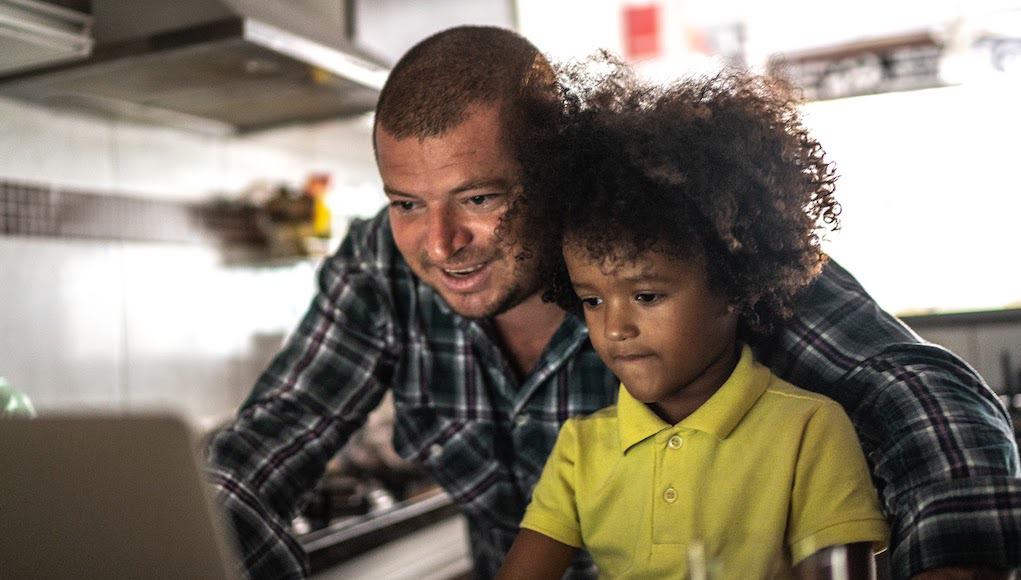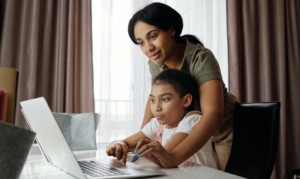Parents as Essential Partners in Pivoting their Child’s Education & Fostering Remote Learning

By: Rebecca Holmes
As a mother, educator, former associate state education commissioner, and CEO of the nonprofit Colorado Education Initiative, I have a unique vantage point to the home, classroom, and school. I deeply empathize with the severe stress and anxiety facing students, parents, teachers, and school leaders this fall.
Parents call me daily in tears worried how they will handle the colossal disruption to their child’s education that began this spring. They’ve lurched to solutions and made unrealistic demands from schools and teachers. We are parenting from a place of fear, so easy to do even when we know it’s not good for kids who no doubt feel our tension. Such stress and anxiety diminish the capacity to be creative, learn new skills, and think outside the box at exactly the time we need those skills the most.
Families and Schools: Preparing Kids for the Evolving Future
The problems of parenting and problems of schools are remarkably related. Neither were designed for today’s modern world, and we are struggling to catch up. We as parents make choices largely to align with or reject what we experienced in our homes growing up, and without grounding those choices in what we know about the world our kids will inherit as adults. We’re preparing our kids for a world that no longer exists instead of one that is more volatile and complex. How do we parent for that?
We forget we are a more powerful force in our children’s lives than anything related to formal schooling. Yet, parents don’t know enough about how schools work or why they don’t, and as a result we don’t know how to advocate for better, more modern educational practices for our families and communities.
Great parenting can be taught and encouraged in every family and community, and when we forget that, or we don’t believe all parents and communities have gifts and assets to leverage, we over-emphasize schools as the only way to shape young people. Meanwhile, in education circles, we have to leave behind old battle lines that don’t pave the way for an educational system informed by what we know about the future. I believe we can blend both parenting and teacher perspectives while focused on future-ready kids and practices.
A recent ABC News/Ipsos poll, found three in five parents (59%) are concerned about their children falling behind in their education because of the pandemic. Yes, we should certainly think, individually and collectively, about how to make up for what will get missed this year. But we should be equally focused on what’s happening in our homes and think about this as a time to drive independence and collaboration—the very skills we know young people need for the future.
Parents need actionable advice they can make sense of in order to partner with schools to advance innovation and improvement. They also need modern tips for how to parent in a way that better prepares our kids, regardless of the schools they attend. In the school year that’s now beginning, families are essential partners in student learning more than ever before. We need to engage and provide them with a greater sense of agency in their child’s education.
7 Home-Based Steps for Success
Schools pivoting to virtual teaching present real challenges. But there are thoughtful actions almost any family can take to set children up for success this fall and to be a positive force in their child’s growth.
- Encourage an environment where your child and teacher get to know each other. Start the year with a short socially distant or virtual visit. This kind of interaction helps children learn how to be seen and known by seeing and knowing others.
- Enlist other trusted adults in the child’s world. Besides teachers, who else can build or deepen a positive relationship with your child? Don’t forget it really does “take a village.” Is there an aunt, coach, or spiritual leader who could visit weekly or take a midday video call?
- Encourage independence in children. The best and most frustrating thing my family did this spring was support our three-year-old as she learned how to fold laundry, make a sandwich, and feed the dog. Without much else going on, she suddenly had time to try, fail, and try again. Age-appropriate lists of skills like this exist for nearly every developmental stage and offer suggestions of activities for kids to push to the edge of their independence.
- Practice self-regulation and self-awareness. Noticing our mental state is self-awareness and positive intervention is self-regulation. Helping children develop these skills will help them succeed when things are hard and choose beneficial activities and behaviors whether it’s a snack, nap, fresh air, or play.
- Explore learning opportunities through academic or other projects. One of the risks of virtual learning is that students receive information but don’t complete enough work themselves. Start with projects kids produce, whether written, video, or art, rather than simply backfilling basic skills.
- Find a learning buddy. When kids lack socialization, they also miss collaboration—one of the most critical future-ready skills. Is there a relative, friend, or classmate with whom a child could partner on a project of shared passion?
- Be honest in age appropriate ways. Children are intuitive. Speak to them honestly, regardless of their age, explain your plan, and provide support to manage fear and uncertainty.
With these research-proven suggestions, we as parents can form a plan that sets a positive tone for the school year, offers a sense of certainty for our kids, and bolsters their learning. We can parent from a place of purpose, rather than fear, and use this year to learn more about our children’s unique gifts, talents, and interests. And, when school returns to normal, my hope is parents demand more inquiry-based, student-driven, joyful approaches to education. The good news is that American schools have more and more proof-points of those practices every year.
For more, see:
- Learning Coach Academy: Supporting the Role of Parents or Guardians in Remote Learning
- A Resource for COVID-Weary Parents: New eBook on Doing PBL at Home
- Engaging Families During Distance Learning
Rebecca Holmes is the President and CEO of Colorado Education Initiative (CEI). She was previously Associate Commissioner at the Colorado Department of Education. She began her career as a middle school teacher and spent many years leading a system of schools serving over 90% low-income students.
Stay in-the-know with innovations in learning by signing up for the weekly Smart Update.





Morrison Paul
Nice Post!
Barbara Peterson
I so appreciate this post - I've been looking for these affirmations of parents and family learning. As an educator who works in rural Hispanic and farming communities I know that there are families with multiple siblings in many of our households who - if guided and encouraged by their district educators - could expand the number of hours the family spends - collectively -- in learning. This is beyond observing the completion of endless 'on-line' meeting and uploading of assignments. As our families head inside at the end of the growing season, we have the potential of strengthening the learning ecosystem in our families' home. But what we need to do that, is the TRUST that our families can and WANT be a great partner with us. We invoke the term 'children's first teachers' with regard to parents - if we honored that more, we could get so much more help in building strong interdependent learners in our families and could help our educational system to be stronger at the end of this social distancing. We need to endorse more ways of teaching, more ways of learning.